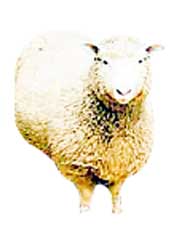The proud father of the 6-year-old sheep, Prof. Ian Wilmot, estimates: the process will last six months; Claims: A research institute in Edinburgh has already approved the project for me; The British House of Commons approved experiments on human embryos
Voila system!

Dolly. Soon a brother for two (Photo: Reuters)
The "father" of Dolly the sheep, Prof. Ian Wilmot, announced that he plans to clone a human embryo within six months. According to Wilmot, one of the fathers of the cloning revolution, the appropriate authorities at the Rosslyn Institute in Edinburgh, Scotland, have already approved the project. "The approval was given by both the ethics committee and the management of the institute," said the professor. "We expect the whole process to last about 6 months." Now, according to him, the idea must be examined by other external parties.
Wilmot is in charge of the institute, where Dolly was born about six years ago, and where she lives. Dolly is the first mammal to clone from an adult cell. The Ananova website reports that Wilmot intends to use the same technique he used to clone the sheep, which is a "nucleus transfer technique in a cell", in the planned project. According to him, "the possibility of replicating human cells exists from a research point of view."
The British House of Representatives approved about a year and a half ago the use of human embryos for research. The House of Commons vote was welcomed by the UK Science Office, which was the first to present the proposal to the government. "I myself am happy," said the spokesman of the ministry, "and I am convinced that my happiness will also be the happiness of the public of patients and caregivers, this is the right step."
Dr. Austin Smith, from the Human Genome Research Institute at the University of Edinburgh, said that the decision is good news. "If the House of Representatives decided otherwise, it would have dire implications," added Smith, "especially for those suffering from diseases like Parkinson's, diabetes or Alzheimer's, for whom research on human embryos is the only hope."
The decision to approve the experiments on human embryos will make it possible to take stem cells from embryos at an early developmental stage - the first days after fertilization. The scientists believe that the research in these cells will lead to a real revolution in the treatment of degenerative diseases.
עודכן ב-14/10/02 15:29
The team that cloned Dolly cloned human embryos
From the Guardian
The research plan: the nucleus of a human cell with genetic diseases will be fused to the egg so that a new entity is obtained - the first cell of a cloned human embryo, which will begin to divide. The stem cells of the fetus will be used to research drugs that will cure the disease
The success in animal cloning attempts
Professor Jan Wilmot, head of the team that cloned Dolly the sheep, is about to attempt to clone human embryos for disease research.
Professor Wilmot, who emphasizes that any human clone he creates will not develop beyond the stage of a group of microscopic cells, hopes to be the first to take advantage of the change in British law that allows the procedure. At the conference in Berlin, Wilmot said that he hopes that his laboratory at the Roslin Research Institute in Edinburgh will apply for a research license from the Human Fertilization and Embryology Authority (HFEA) within six months.
According to the research plan, cells will be taken from people with genetic diseases. The scientists will remove the genes from the nucleus of one of the cells and implant them into an egg. Using an electric shock, the genes and the egg will be welded so that a new entity will be obtained, which is, in fact, the first cell of a cloned human embryo that will begin to divide. According to the plan, the stem cells that will be taken from the created embryo will replicate themselves without limitation and can be used for researching drugs that will cure the disease.
Wilmot's plan is controversial, because its goal is to create cloned embryos not for the purpose of growing cells and organs for transplant purposes but for the purpose of researching diseases, a goal that can be achieved by animal research. Also, Professor Wilmot wants, in fact, to combine two technologies - cloning of animals and processing of embryonic stem cells - experimental and still unreliable technologies.
Another problem with Wilmot's plan is that the research could not be carried out without a steady supply of human eggs, which would be provided by donors. In the current study of embryonic stem cells, human embryos are used that were donated by couples who are undergoing fertilization treatments and are no longer of use - embryos intended for destruction or freezing. However, women who donate eggs for the proposed research will donate eggs that could be used to help infertile couples.
Professor Wilmot noted that a team of scientists in Edinburgh is developing technologies that will allow eggs to be extracted from women in a way that does not involve the difficulties and unpleasantness that characterize fertility treatments.
